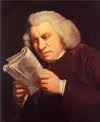“No man but a blockhead ever wrote, except for money.” (reported by Boswell, in his Life of Johnson)
 Attributed to Samuel Johnson (1709-1784), the renowned author and lexicographer, that’s one of the most famous writerly aphorisms in the English language.
Attributed to Samuel Johnson (1709-1784), the renowned author and lexicographer, that’s one of the most famous writerly aphorisms in the English language.
Others have seen things differently.
 Arthur Schopenhauer, for one (1788-1860), had this to say about the matter:
Arthur Schopenhauer, for one (1788-1860), had this to say about the matter:
“There are above all two kinds of writer: those who write for the sake of what they have to say and those who write for the sake of writing. The former have had ideas or experiences which seem to them worth communicating; the latter need money and that is why they write—for money. They think for the purpose of writing. You can recognize them by the fact that they spin out their ideas to the greatest possible extent, that their ideas are half-true, obscure, forced and vacillating, and that they usually prefer the twilight so as to appear what they are not, which is why their writings lack definiteness and clarity. You can soon see they are writing simply in order to cover paper: and as soon as you do see it you should throw the book down, for time is precious. – Payment and reserved copyright are at bottom the ruin of literature. Only he who writes entirely for the sake of what he has to say writes anything worth writing. It is as if there were a curse on money: every writer writes badly as soon as he starts writing for gain. The greatest works of the greatest men all belong to a time when they had to write them for nothing or for very small payment: so that here too the Spanish proverb holds good: Honra y provecho no caben en un saco [Honour and money don’t belong in the same purse].” (Essays and Aphorisms, my highlight )
And whatever Johnson had to say about it, he himself wrote compulsively, prodigiously, and surely wouldn’t have done it only for the money. Nevertheless, in closing, we can give him the last word. When Sir John Hawkins suggested to Johnson that the very editing of Shakespeare had to be a satisfaction in itself, Johnson replied, “I look upon this as I did upon the Dictionary: it is all work, and my inducement to it is not love or desire of fame, but the want of money, which is the only motive to writing that I know of.” (Sir John Hawkins, The Life of Samuel Johnson)
Anyway, now Jack can relax and settle down to writing whatever it takes, and forget about the novel. Maybe.
For my part, I’ll just carry on writing, come what may, buyers or no buyers, readers or no readers. Maybe I’m a moron.
“Another damned thick book! Always scribble, scribble, scribble! Eh, Mr. Gibbon?”
Attributed to Prince William Henry, Duke of Gloucester and Edinburgh, 1781, upon receiving the second (or third, or possibly both) volume(s) of The History of the Decline and Fall of the Roman Empire from the author. quoted by Sir Leslie Stephen in the Dictionary of National Biography, (1921), vol. 21, p. 1133. (Wikiquote)

What about us that do it for both?
Aha! I thought this was a hiccough Molly McGill posting, but now I realize you’re another Molly. Sorry. Anyway, I’d go with Molz and Collin (below). Doing it for both is the best of all worlds, and I hope the end-of-the-author doomsayers are wrong.
These are lifted from my Facebook page (so hungry is my site for comments, eh?):
Molz McGill. What about us that do it for both? Are we just blockheads with something to say? Perhaps not quite blockheads…because we figured out how to make money at it (writing)?
6 hours ago ·
Collin Piprell. Can’t say I side with either Johnson or Schopenhauer. I’m with you, somewhere in the middle. Some opinion has it, however, that novelists who aren’t yet established may find themselves writing only for the love of it or not writing at all. Let’s hope not. It’s nice to think there’s at least the price of a beer waiting at the end of our long labors. Cheers
5 hours ago ·
From the little I know about it, one writes because one has to, because that is what one is: a writer. A musician makes music because that is what musicians do. From what talented people tell me, they have little choice in the matter. Even if some are less talented than others. Still, in my opinion, they are writers – just not especially good ones.
I’ve been told at times that I do it well, write, that is. But I don’t believe this makes me a writer, since I do it so little; and since I’m not practicing writing, it doesn’t evolve, develop, or grow. My voice is shakey, adolescent, immature.
One hopes that those whose styles and voices have evolved and developed will gain larger and larger audiences. Historically, however, this has typically meant the LCD (Lowest Common Denominator) theory of publishing, especially in the short term. Thus, Dan Brown and Michael Crighton are considered writers, when in fact they may really be songwriters, cryptographers, or doctors – and maybe they should have stuck with those professions. In fact, most are simply celebrities nowadays.
With the Internet, all “real” writers can publish their work, a good thing. The trick now is to have more and better sites filtering all these words, and collecting the “good”, original work of “value”. Of course this value will always be relative, genre-specific, and so on, but I for one would love to see more meta-literary sites chock-full of sexy prose.
Perhaps Collin can list more of these here – or start a thread pertaining to this?
That’s my “writing” for the day. How many of you made it this far?
I made it. Good observations. And I will link to more sites that take a critical look at books (by which I mostly mean they recommend books that others have enjoyed, giving some idea why). … A note in passing, sir: I know your own writing, and I suspect you’re waxing a tad overly modest. Cheers
Herr Schopenhauer was born wealthy and never needed to work at anything for money. I don’t trust the economic opinions of a man who has never known need.
Aye, and it’s a sure judge of men ye be — I think you’re right about Schopenhauer. Some nice turns of phrase, though, and a useful other pole to the good Dr. Johnson’s curmudgeonly remark.